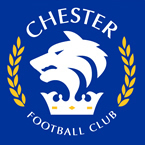|
As the 20th century dawned Chester
F.C were homeless following the loss of the Old Showground
to builders in 1899. A new home was found in Whipcord
Lane in 1901 and the club won the Combination League
in 1909 after finishing runners-up in the preceding
5 seasons. The early 1900s saw the first of Chester's
Welsh Cup victories, against Connah's Quay in 1908,
(further victories followed in 1933 and 1946). By now
the club had moved to the much loved Stadium in Sealand
Road which remained home for 84 years until the final
game against Rotherham in April 1990.
In 1910 Chester were elected to the
Lancashire Combination and after the First World War
were founder members of the Cheshire County League
which they won in 1922, 1926 and 1927. The appointment
of Charlie Hewitt as manager in 1930 saw a concerted
effort to attain League status and crowds flocked to
the Stadium to see the goalscoring exploits of Salford
school master Arthur Gale who scored an incredible
73 goals in 39 League games.
On June 1st 1931 Chester were elected
to the Football League, in place of Nelson, and throughout
the 1930s never finished outside the top 10 in Division
Three North. In 1933 Chester hammered Second Division
Fulham 5-0, their finest FA Cup performance, and in
1936 the club achieved their highest League victory,
a 12-0 win over York City.
Chester struggled in the years following
the Second World War but were well served by stalwarts
Ray Gill (a record 406 appearances), Ron Hughes, Eric
Lee and Tommy Astbury. In 1964/65 the "Famous Five" forward
line of Talbot, Metcalf, Ryden, Morris and Humes scored
116 of Chester's record 119 League goals while, in
the FA Cup, the club were narrowly beaten 2-1 by League
champions Manchester United after leading at half time.
Promotion from Division 4 was achieved
under Ken Roberts in 1974/75. The club also reached
the League Cup Semi-Final where they were narrowly
defeated by Aston Villa following victories over League
champions Leeds United (arguably the club's Match of
the Century) and Newcastle United.
The late 1970s saw the emergence
of Ian Rush, who became the club's record transfer
when he moved to Liverpool for �300,000. Relegation
in 1982 was followed by a name change, to Chester City,
in 1983 and three years later Harry McNally led the
club back into Division 3.
After two seasons in exile at Macclesfield
a return to Chester for the 1992/93 season sadly ended
in relegation but Graham Barrow took the club straight
back up. Kevin Ratcliffe took over as manager in 1995
and led the club through some difficult times culminating
in a traumatic 1998/99 season when the club almost
folded. During the summer Terry Smith moved in, initially
as chairman but later as manager.
Chas
Sumner
|
